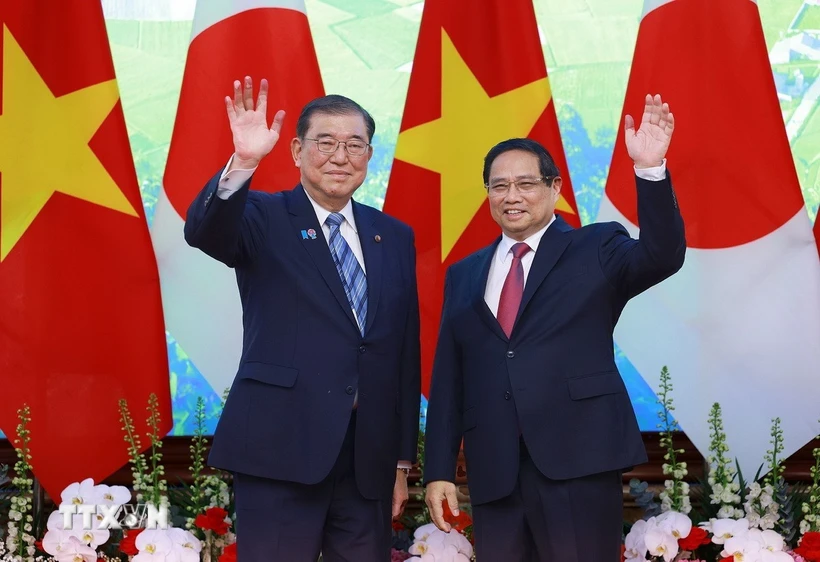HCMC – Vietnamese Prime Minister Pham Minh Chinh and his Japanese counterpart Ishiba Shigeru agreed to step up political trust and expand cooperation across multiple sectors, including technology, investment, and labor mobility, during their talks in Hanoi today, April 28.
Prime Minister Ishiba Shigeru is in Vietnam for an official visit from April 27 to 29 at the invitation of PM Pham Minh Chinh. The visit marks his first trip to Vietnam since taking office.
During the talks held after a formal welcoming ceremony at the Government Office, both leaders praised the Vietnam-Japan comprehensive strategic partnership which was set up nearly two years ago. They committed to enhancing cooperation under the guiding principles of “sincerity, affection, trust, substance, effectiveness, and mutual benefit” across five key areas: politics; economic and human resource connectivity; defense and security; science, technology, and green transition; and multilateral cooperation.
Economic, technology, and ODA cooperation
The two prime ministers agreed to intensify substantive and sustainable economic ties, accelerate a new generation of official development assistance (ODA) for strategic infrastructure projects, and facilitate stronger investment and trade ties. Chinh called for Japan’s continued support for the Vietnamese business community, which includes 70 IT companies and 5,000 engineers participating in Japan’s digital transformation and IT supply chains.
Both sides reviewed progress on key joint projects such as HCMC Metro Line No. 1, the Vietnam-Japan University, and Cho Ray Hospital 2, pledging to speed up their completion. They also agreed to promote high-tech agricultural cooperation and sign a medium- and long-term agricultural cooperation vision for 2025-2030.
Chinh reiterated Vietnam’s commitment to improving the business environment to attract more Japanese investors. Both leaders identified science, technology, innovation, and high-quality human resource training as new pillars of bilateral relations, with joint efforts to develop digital economies, semiconductors, AI, quantum, nuclear energy, and green transition initiatives.
Japan pledged support for Vietnam’s semiconductor research and doctoral training through the networked exchange, united strength for stronger partnerships between Japan and ASEAN and announced plans to implement 15 energy transition projects in Vietnam, valued at over US$20 billion, under the Asia Zero Emissions Community (AZEC) and the Asia Energy Transition Initiative (AETI).
Labor, people-to-people and climate cooperation
The two countries agreed to strengthen labor and human resource ties, launch negotiations for a bilateral social insurance agreement in 2025, and facilitate Vietnamese community activities in Japan, which is now home to over 600,000 Vietnamese workers. Both sides will also work to streamline visa procedures and expand mutual tourism, aiming for two million visits annually.
They committed to expanding cooperation in disaster response, climate change adaptation, local-level partnerships, and cultural and tourism exchanges. A Vietnam-Japan Local Forum is scheduled for late 2025 in Vietnam.
Regional and international cooperation
Both prime ministers reaffirmed the importance of upholding international law and a rules-based order, particularly in the East Sea, and of resolving maritime disputes peacefully in line with the 1982 United Nations Convention on the Law of the Sea (UNCLOS) and the Declaration on the Conduct of Parties in the East Sea (DOC).
Japan will support Vietnam in hosting APEC 2027 and is considering sending a government delegation to the 16th United Nations Conference on Trade and Development (UNCTAD) in Hanoi in 2025.
PM Chinh thanked Japan for its support in post-typhoon recovery, the Covid-19 pandemic, and green growth efforts. He confirmed Vietnam’s participation in “Vietnam Day” activities at Expo Osaka Kansai 2025.









